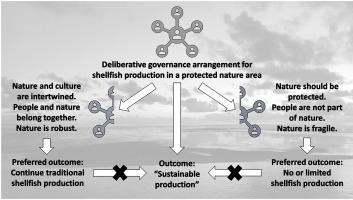当前位置:
X-MOL 学术
›
Ocean Coast Manage.
›
论文详情
Our official English website, www.x-mol.net, welcomes your feedback! (Note: you will need to create a separate account there.)
Struggling over shellfish: How diverging perceptions of marine nature distort deliberative governance
Ocean & Coastal Management ( IF 4.6 ) Pub Date : 2020-12-01 , DOI: 10.1016/j.ocecoaman.2020.105384 Susan de Koning , Nathalie A. Steins , Hilde M. Toonen
Ocean & Coastal Management ( IF 4.6 ) Pub Date : 2020-12-01 , DOI: 10.1016/j.ocecoaman.2020.105384 Susan de Koning , Nathalie A. Steins , Hilde M. Toonen

|
Abstract Deliberative governance is gaining increasing attention in the management of natural resources with conflicting stakes. Although disputed knowledge is known to affect deliberation, the role of perceptions is understudied. Based on a case study in the Dutch Wadden Sea, a marine protected area, we examine the social representations of shellfish fisheries and marine nature of stakeholders within one deliberative governance arrangement, the Mussel Covenant. Our results show that within this covenant there are two opposing social representations of marine nature which both are not in line with the agreed objectives. Instead, governmental policies still form the guidelines to covenant decisions. We conclude that diverging representations and state-influence decrease deliberation. Therefore, we argue that deliberative governance is not possible without explicitly considering the different cognitive, normative and expressive meanings attached to the marine area or issue at stake. To achieve deliberation, values of stakeholders should explicitly be acknowledged and discussed, and state-influence should be kept to a minimum.
中文翻译:

争夺贝类:对海洋自然的不同看法如何扭曲审议治理
摘要 在具有冲突利益的自然资源管理中,协商治理越来越受到关注。尽管已知有争议的知识会影响商议,但知觉的作用尚未得到充分研究。根据在海洋保护区荷兰瓦登海的案例研究,我们在一项审议性治理安排“贻贝公约”中检查了贝类渔业的社会代表性和利益相关者的海洋性质。我们的结果表明,在该公约中,海洋自然有两种对立的社会表征,它们都不符合商定的目标。相反,政府政策仍然构成契约决定的指导方针。我们得出的结论是,不同的表述和国家影响会减少深思熟虑。所以,我们认为,如果不明确考虑海洋区域或所涉问题的不同认知、规范和表达意义,就不可能进行协商治理。为了实现协商,利益相关者的价值观应该得到明确的承认和讨论,并且应该将国家影响保持在最低限度。
更新日期:2020-12-01
中文翻译:

争夺贝类:对海洋自然的不同看法如何扭曲审议治理
摘要 在具有冲突利益的自然资源管理中,协商治理越来越受到关注。尽管已知有争议的知识会影响商议,但知觉的作用尚未得到充分研究。根据在海洋保护区荷兰瓦登海的案例研究,我们在一项审议性治理安排“贻贝公约”中检查了贝类渔业的社会代表性和利益相关者的海洋性质。我们的结果表明,在该公约中,海洋自然有两种对立的社会表征,它们都不符合商定的目标。相反,政府政策仍然构成契约决定的指导方针。我们得出的结论是,不同的表述和国家影响会减少深思熟虑。所以,我们认为,如果不明确考虑海洋区域或所涉问题的不同认知、规范和表达意义,就不可能进行协商治理。为了实现协商,利益相关者的价值观应该得到明确的承认和讨论,并且应该将国家影响保持在最低限度。



























 京公网安备 11010802027423号
京公网安备 11010802027423号